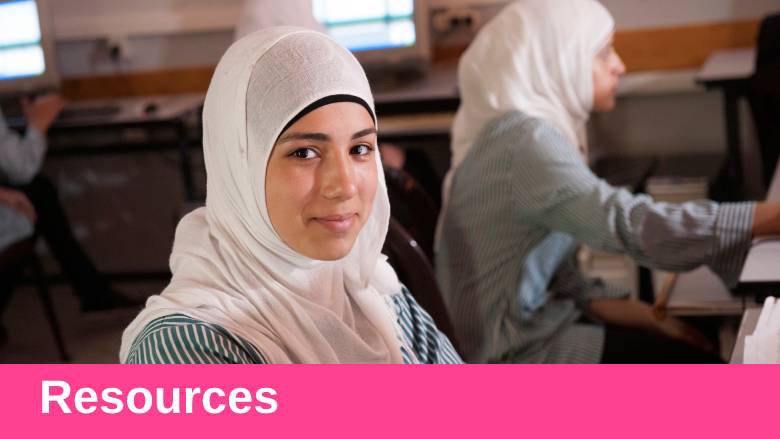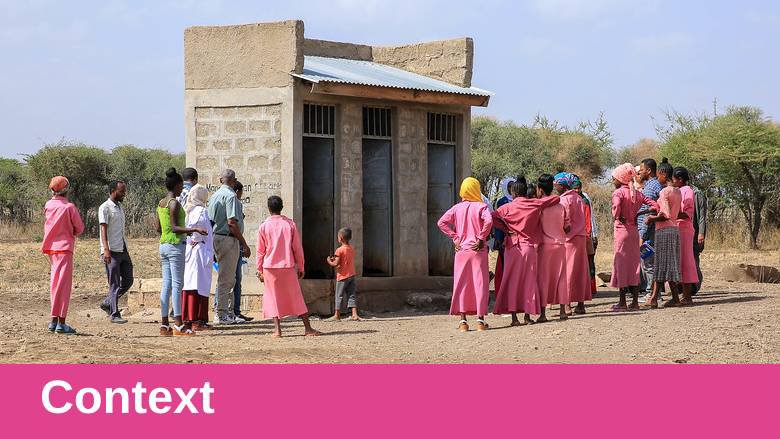
Context
Menstrual Health and Hygiene (MHH) is essential to the well-being and empowerment of women and adolescent girls. On any given day, more than 300 million women worldwide are menstruating. In total, an estimated 500 million lack access to menstrual products and adequate facilities for menstrual hygiene management (MHM). To effectively manage their menstruation, girls and women require access to water, sanitation and hygiene (WASH) facilities, affordable and appropriate menstrual hygiene materials, information on good practices, and a supportive environment where they can manage menstruation without embarrassment or stigma.
According to the WHO/UNICEF Joint Monitoring Programme 2012, menstrual hygiene management is defined as:
“Women and adolescent girls are using a clean menstrual management material to absorb or collect menstrual blood, that can be changed in privacy as often as necessary, using soap and water for washing the body as required, and having access to safe and convenient facilities to dispose of used menstrual management materials. They understand the basic facts linked to the menstrual cycle and how to manage it with dignity and without discomfort or fear.”
The challenges that menstruating girls, women, and other menstruators face encompass more than a basic lack of supplies or infrastructure. While menstruation is a normal and healthy part of life for most women and girls, in many societies, the experience of menstruators continues to be constrained by cultural taboos and discriminatory social norms. The resulting lack of information about menstruation leads to unhygienic and unhealthy menstrual practices and creates misconceptions and negative attitudes, which motivate, among others, shaming, bullying, and even gender-based violence. For generations of girls and women, poor menstrual health and hygiene is exacerbating social and economic inequalities, negatively impacting their education, health, safety, and human development.
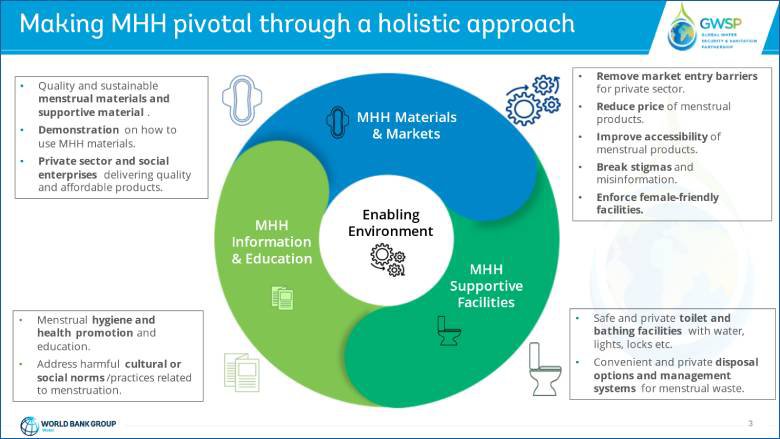
The multi-dimensional issues that menstruators face require multi-sectoral interventions. WASH professionals alone cannot come up with all of the solutions to tackle the intersecting issues of inadequate sanitary facilities, lack of information and knowledge, lack of access to affordable and quality menstrual hygiene products, and the stigma and social norms associated with menstruation. Research has shown that approaches that can effectively combine information and education with appropriate infrastructure and menstrual products, in a conducive policy environment, are more successful in avoiding the negative effects of poor MHH – in short, a holistic approach requiring collaborative and multi-dimensional responses.
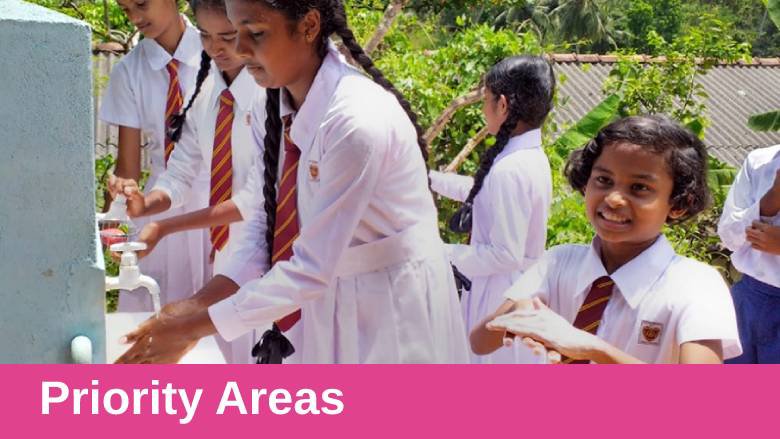
Education
In low-income countries, half of the schools lack adequate water, sanitation, and hygiene services crucial to enable girls and female teachers to manage menstruation (UNICEF 2015). Many studies argue that inadequate sanitary facilities affect girls’ experiences at school, causing them to miss classes during their menstruation or even drop out. Schools that have female-friendly facilities and incorporate information on menstruation into the curriculum for both girls and boys can reduce stigma and contribute to better education and health outcomes.
• A meta-analysis on the status of menstrual hygiene among adolescent girls in India found that a quarter of the girls did not attend school during menstruation because of the lack of adequate toilets (Van Eijk et al. 2016).
• In South Sudan, 57 percent of surveyed adolescent girls reported staying home during menstruation because of the lack of private changing rooms in school (Tamiru et al. 2015).
• A study in Kenya found that 95 percent of menstruating girls missed one to three school days, 70 percent reported a negative impact on their grades, and more than 50 percent stated falling behind in school because of menstruation (Mucherah and Thomas 2017).
• A survey in Bangladesh found that only 6 percent of schools provide education on health and hygiene, and only 36 percent of girls had prior knowledge about menstruation before their first period (World Bank 2017c).
• A sanitary pad intervention in Ghana found that after six months of free sanitary pad provision and puberty education programming, girls missed significantly less school (Montgomery et al. 2012).
Health
When girls and women have access to safe and affordable sanitary materials to manage their menstruation, they decrease their risk of infections. This can have cascading effects on overall sexual and reproductive health, including reducing teen pregnancy, maternal outcomes, and fertility. Poor menstrual hygiene, however, can pose serious health risks, like reproductive and urinary tract infections which can result in future infertility and birth complications. Neglecting to wash hands after changing menstrual products can spread infections, such as hepatitis B and thrush.
• Studies have found that giving out sanitary pads to girls leads to a significant reduction in sexually transmitted infections and bacterial vaginosis (Benshaul Tolonen et al. 2019; Phillips-Howard et al. 2016).
• The lack of means for hygienic management of menstruation can cause discomfort and psychological stress and adds to the shame and sometimes depression that women and girls experience because of menstruation-related taboos and stigma (Sweetman and Medland 2017).
Gender Equality
Promoting menstrual health and hygiene is an important means for safeguarding women’s dignity, privacy, bodily integrity, and, consequently, their self efficacy. Awareness of MHH contributes to building an enabling environment of nondiscrimination and gender equality in which female voices are heard, girls have choices about their future, and women have options to become leaders and managers.
• Discriminatory social norms, cultural taboos, and stigma associated with menstruation can lead girls to follow unsafe practices.
• A study in Egypt found many schoolgirls reporting that they do not bathe during their menstruation because it is considered a social taboo to come in contact with water during the menstrual cycle (ElGilany, Badawi, and El-Fedawy 2005).
• A study in Nepal found that many girls were forced to stay in a hut or slept in the fields during their period even though the government had decreed this practice illegal (Thompson et al. 2019).
Economy
Improving menstrual hygiene and providing access to affordable menstrual materials can help improve girls’ and women’s access to education, opening more options for jobs, promotions, and entrepreneurship, thus unleashing female contributions to the overall economy, rather than keeping them at home. In addition, feminine hygiene products are a multibillion-dollar industry, which, if properly tapped into, can generate income for many and significantly boost economic growth.
• Girls who drop out of school have limited employment opportunities and often marry early and begin bearing children, further reducing their options for earning income.
• Women who lack female-friendly sanitation facilities in the workplace lose wages for days of work missed during menstruation and are viewed as unreliable workers, diminishing options for advancement.
• Because of financial constraints or limited markets, many girls and women are unable to access adequate menstrual products.
Environment
Disposable sanitary products contribute to large amounts of global waste. Ensuring women and girls have access to sustainable and quality products, and improving the management of the disposal of menstrual products, can make a big difference to the environment.
• Every year, an average woman trashes about 150 kilograms of nonbiodegradable waste. In India alone, roughly 121 million women and girls use an average of eight disposable and non-compostable pads per month, generating 1.021 billion pads waste monthly, 12.3 billion pads waste annually, and 113, 000 metric tons of annual menstrual waste (Bhor and Ponkshe 2018; PATH 2017).
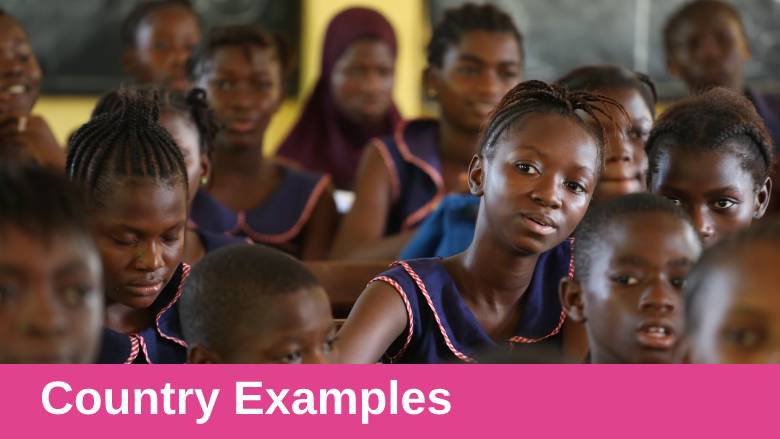
Enhancing opportunities for women to access adequate menstrual health and hygiene is central to the World Bank Group in achieving its development outcomes. MHM cuts across many development sectors, and the Bank addresses this through collaboration and a holistic approach, as demonstrated in recent examples from World Bank operations:
• In Bangladesh, the Rural Water, Sanitation and Hygiene for Human Capital Development Project is giving women access to microfinance loans and sanitation grants for investment in household WASH facilities. In addition, the project is facilitating behavior change sessions and training on the importance of menstrual hygiene and safely managed WASH facilities. At the community level, the project will construct MHH-friendly facilities in public places and promote women’s representation and leadership in water management committees. Access to finance will be provided to 150 women entrepreneurs to help them market and sell soaps, disinfectants and menstrual hygiene products at household doorsteps. This will improve menstrual hygiene practices, especially among those who are too shy and reluctant to purchase them at public markets.
• In Eswatini, a Water Supply and Sanitation Access Project is promoting design approaches to ensure that sanitation and hygiene facilities are constructed in schools to meet the needs of women and girls. This includes gender-separated facilities with door locks, lighting, disposal bins, and handwashing stations with soap and water. Behavior changes and hygiene promotion campaigns incorporating MHH will be undertaken, targeting students, teachers, parents and the larger community.
• The GAMA Sanitation and Water Project in Ghana launched an in-depth qualitative study to understand the influences of MHM interventions in schools on adolescent girls’ educational engagement. Under the project, sanitation facilities were constructed at more than 260 schools across the Greater Accra Metropolitan Area. The facilities all include separate toilets and changing rooms for girls, with locks on doors, handwashing facilities, and hygienic and safe spaces for disposal of used sanitary products.
• The Scaling-Up Water Supply, Sanitation and Hygiene Project, a multi-sectoral WASH project in Lao PDR, employs a nutrition convergence approach with infrastructure service delivery and behavior change at the community and household level. The project aims to address low attendance of adolescent girls in schools by ensuring that school sanitation facilities provide functional single-sex toilets with a reliable supply of water and soap. Educational materials on hygiene and MHM will also be provided and dispersed.
• In rural areas of Mozambique, the upper primary school completion rate is just 14 percent for males and 8 percent for females, severely limiting livelihood opportunities. Few schools have adequate sanitation facilities, and those that do are poorly maintained and unsuitable for MHH. The Urban Sanitation Project is responding with a sanitation marketing and hygiene promotion campaign emphasizing the improvement of menstrual hygiene for girls and women. It is financing construction of 78 sanitation facilities in schools and market places in two project cities. Standard designs include handwashing facilities, accessibility for people with disabilities, and MHH amenities. MHH and hygiene promotion activities, including training for teachers and pupils, will be conducted in the schools. These approaches will inform future interventions in schools across the country.
Publications
The Enabling Environment for Menstrual Health and Hygiene: Case Study – Kenya
Menstrual Health and Hygiene Resource Package: Tools and Resources for Task Teams (PDF)
The Rising Tide : A New Look at Water and Gender
Feature Stories
A Holistic Approach to Better Menstrual Health and Hygiene: Entrepreneurs in Action
#ItsTimeForAction: Investing in Menstrual Hygiene Management is to Invest in Human Capital
Menstrual Hygiene Management Enables Women and Girls to Reach Their Full Potential
Keeping Tanzania’s Girls in School: Investing in Menstrual Hygiene
Blogs
Menstrual health and hygiene empowers women and girls: How to ensure we get it right
Reflections from a mother on Menstrual Hygiene Day
The SDGs, surveys, and the need for additional evidence on Menstrual Hygiene Management
Globally, periods are causing girls to be absent from school
External Resources


